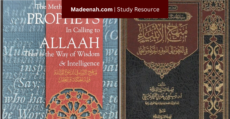Reference: www.al-badr.net/web/index.php?page=article&action=article&article=7
Anas (may Allah be pleased with him) narrated that the Prophet (sal Allaahu alayhi wa sallam) said:
Indeed from among the people are those who are keys to goodness and closures of evil. And indeed from among the people are keys to evil and closures to goodness. So glad tidings for the one who Allah has made him a key to goodness and woe to the one who Allah has made a key to evil.[1]
That which is obligatory upon whoever wants for himself to be a key to goodness and a closure of evil, and its glad tidings:
1. Al-Ikhlaas – sincerity to Allah in all your speech and action. Indeed sincerity is the basis of all good, and the fountain of all virtue.
2. Du’aa – To supplicate and return to Allah in order that he may be given the guidance to be so. For indeed the Du’aa is a key to all goodness. Allah does not refuse to answer the supplication of His servant and He does not disappoint a believer after he has called Him.
3. Dedication to seeking knowledge – for indeed knowledge is a cause for virtue and lofty actions, and it is a barrier preventing all evil and indecency.
4. Al-Ibaadah – To turn to worshipping Allah, especially the obligatory acts of worship; particularly the prayer, as it prevents lewdness and evil.
5. Good Manners – to adorn yourself with good noble manners and to distant yourself from bad manners that are lowly.
6. Good Companions – to keep yourself amongst good companions and to sit with the righteous people. For indeed the angels lower their wings upon the gatherings of righteous people and the mercy of Allah descends upon such gatherings. Also, be aware of the gatherings of the disobedient and evil people.
7. An-Naseehah – to sincerely advise the servants of Allah when living among them, and dealing with them. This is done through keeping them busy with goodness and turning them away from evil.
8. Day of Recompense – to remember and recall the day when you will stand in front of the Lord of the Worlds, and that He will reward all goodness with His goodness, as he will recompense all evil with its consequences.
As Allah said,
{So whosoever does good equal to the weight of an atom shall see it. And whosoever does evil equal to the weight of an atom shall see it} [99:08]
Conclusion: All of the above is based upon the servant desiring goodness, and wanting goodness for others and wanting to benefit the servants of Allah. So whenever one’s desire is present, the intention correct and established and the resolve certain, as well as seeking the help of Allah in all of this and taking the relative means, he will – by the permission of Allah – be from among the keys to goodness and closures of evil.
And Allah is the One who protects and helps His slaves through His guidance, He gives victory to whoever He wants by the truth and He is the best of those who aids and gives judgments.
Footnotes
[1] Narrated by Ibn Maajah, declared Hasan by Albaani
كن مفتاحاً للخير
المرجع: www.al-badr.net/web/index.php?page=article&action=article&article=7
عن أنس بن مالك رضي الله عنه قال: قال رسول الله صلى الله عليه و سلم: ((إن من الناس مفاتيح للخير مغاليق للشر، و إن من الناس مفاتيح للشر مغاليق للخير. فطوبى لمن جعل الله مفاتيح الخير على يديه، و ويل لمن جعل الله مفاتيح الشر على يديه)) [رواه ابن ماجة و حسنه الألباني رحمه الله في صحيح سنن ابن ماجه]
و من أراد لنفسه أن يكون من مفاتيح الخير مغاليق الشر أهلِ طوبى، فعليه بما يلي:
1) الإخلاص لله في الأقوال و الأعمال، فإنه أساس كل خير و ينبوع كل فضيلة؛
2) الدعاء و الإلحاح على الله بالتوفيق لذلك، فإن الدعاء مفتاح لكل خير، و الله لا يرد عبداً دعاه و لا يخيب مؤمناً ناداه؛
3) الحرص على طلب العلم و تحصيله، فإن العلم داع إلى الفضائل و المكارم حاجز عن الفحشاء و العظائم؛
4) الإقبال على عبادة الله و لاسيما الفرائض، و بخاصة الصلاة فإنها تنهى عن الفحشاء و المنكر؛
5)التحلي بمكارم الأخلاق و رفيعها، والبعد عن سفاسف الأخلاق و رديئها؛
6)مرافقة الأخيار و مجالسة الصالحين، فإن مجالسهم تحفها الملائكة و تغشاها الرحمة، و الحذر من مجالس الأشرار و الطالحين، فإنها متنزل الشياطين؛
7) النصح للعباد حال معاشرتهم و مخالطتهم، بشغلهم في الخير و صرفهم عن الشر؛
8) ذكر المعاد و الوقوف بين يدي رب العالمين، فيجازي المحسن بإحسانه و المسئ بإساءته.
{فمن يعمل مثقال ذرةٍ خيراً يره، و من يعمل مثقال ذرةٍ شراً يره} [الزلزلة 7-8]
و عماد ذلك كله رغبة العبد في الخير و في نفع العبد في الخير و قي نفع العباد، فمتى كانت الرغبة قائمة و النية مصممة و العزم أكيداً، و استعان بالله في ذلك و أتى الأمور من أبوابها، كان – بإذن الله – من مفاتيح الخير مغاليق الشر.
و الله يتولى عباده بتوفيقه، و يفتح على من يشاء بالحق و هو خير الفاتحين



